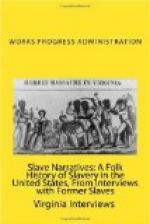“De Kloo Kluxers[FN: Ku Klux’s] was bad up above here, but I never seen any. I hear’d tell of ’em whuppin’ folks, but I don’t know nothin’ ’bout it, much.
“Mos’ all de Niggers dat had good owners stayed wid ’em, but de others lef’. Some of ’em come back an’ some didn’.
“I hear’d a heap o’ talk ‘bout ever’ Nigger gittin forty acres an’ a mule. Dey had us fooled up ’bout it, but I never seen nobody git nothin’.
“I hope dey won’t be no more war in my time. Dat one was turrible. Dey can all go dat wants to, but I aint a-goin’.
“I seen Gen’l Grant at Vicksburg after de war. (He was a little short man.) All de Niggers went dere for somethin’—me ’mongst ’em. I don’t know what we went for.
“I took to steamboatin’ at Vicksburg ’cause I could cut[FN: place for storage or shipment] cotton so good. (I could cut cotton now wid a cotton hook if I warnt so old.)
“I steamboated twixt New Orleans an’ St. Louis on de ‘Commonwealth,’ a freight packet, way up yonder in St. Louis. I don’t know what country dat was in. But de rousters had a big fight one night in New Orleans, shootin’ an’ cuttin’, so I lef’. When I got back to Vicksburg, I quit.
“I picked cotton in de Delta awhile, but de folks, white an’ black, is too hard. Dey don’t care ’bout nothin! I was in Greenville when de water come. I hear’d a noise like de wind an’ I asked dem Niggers, ’Is dat a storm?’ Dey said, ‘No, dat’s de river comin’ th’ough an’ you better come back ‘fore de water ketch[FN: catch] you.’ I say, ’If it ketch me it gwine a-ketch me on my way home.’ I aint been back since.
“Den I come back here an’ went to farmin’ an’ I been here ever since. I bought forty-seven acres an’ a nice little house. De house burnt down, but de white folks built me a better one. Dey’s good an’ kin’ to me. Dey say I’s a good man.
“My wife was six year old at de surrender. She b’longed to Marse Alf, but we was free when we married. We had sixteen chillun. Mos’ of ’em lives ’roun ‘here. Some in Newton, some in Scott, an’ some in Texas. My wife died two years ago las’ March.
“Marse Bob died right here in dis here house. He died a po’ man. If my old mistis had a-been here she wouldn’ a-let’ em treat him like dey done. If I’d a-been here I wouldn’ a-let’ em done like dat, neither.
“I been a-livin’ by myse’f since my wife died. My son, Oscar, lives on de lan’ an’ rents it from me.
“I don’t know what’s gwine a-happen to de young folks now-a-days. Dey know better, but dey’s wild an’ don’t care ‘bout nothin’. I aint got no time to fool wid ’em. Looks like dey don’t care ‘bout workin’ at nothin’.
“I been a-workin’ all my life, an’ I’se seen good times an’ bad times. I loves to work yet. I’s gwine out now soon’s I git my dinner an’ he’p finish pickin’ dat patch o’ cotton. I can pick two hund’ed pounds a day an’ I’s one hund’ed an’ sixteen year old. I picks wid both han’s an’ don’t have to stoop much. My back don’t never ache me atall. My mammy teached me to pick cotton. She took a pole to me if I didn’ do it right. I been a-pickin ever since. I’d ruther pick cotton dan eat, any day.




